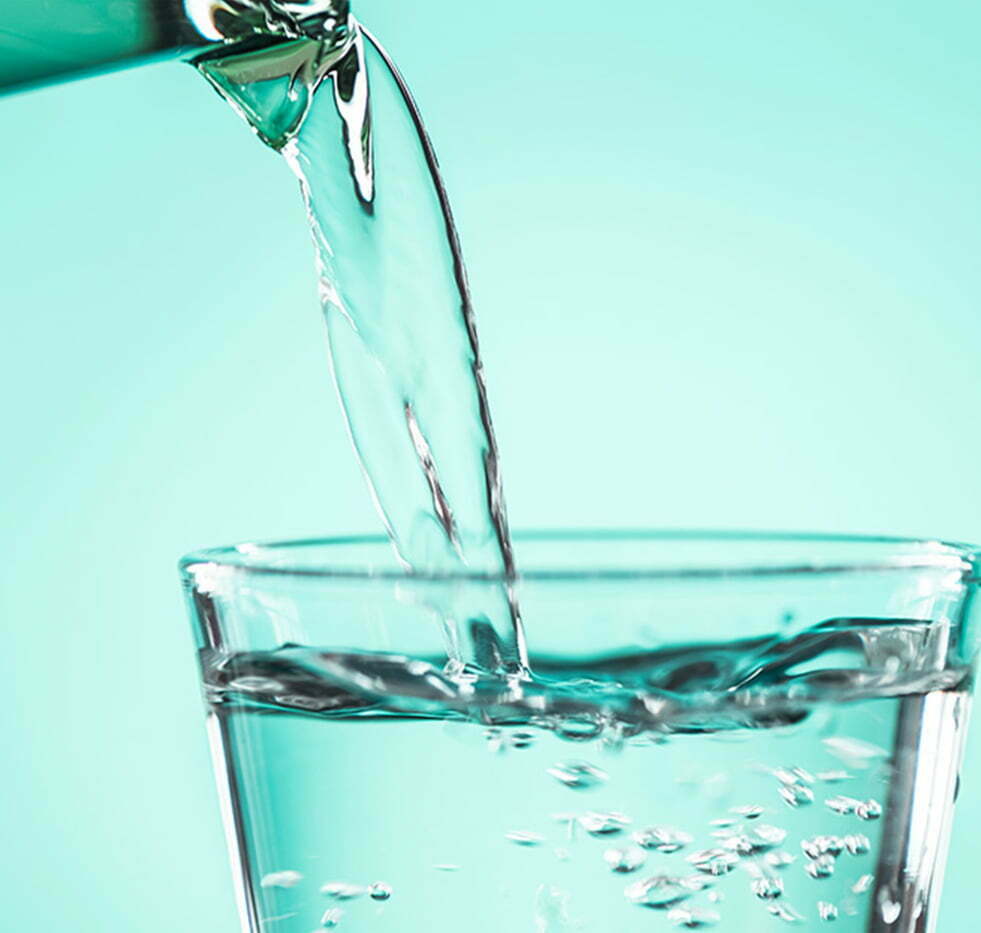I drink more than 2 litres of water a day. However I always seem to be very thirsty after my exercises, despite hydrating before, during and after. I can’t seem to reach that satiety point where I no longer feel thirsty. Is there something wrong with me?
Water exists throughout the body. Cells contain 60% of all water in the body, with roughly one-third of the remainder, surrounding the cells. Some organs contain more water than others, for example the brain 80–85%, kidneys 80–85%, heart 75–80%, lungs 75–80%, muscles 70–75%, liver 70–75%, skin 70–75%, blood 50%, bones 20–25% and teeth 8–10%.
Water is a vital nutrient to the life of every cell. It acts first as a building material. Water also serves a number of essential functions for us including: protecting the brain, spinal cord and other sensitive tissues, removing waste by urination, sweating, and bowel movements, regulating temperature, lubricating and cushioning joints, forms saliva and mucus, delivers oxygen throughout the body via your blood which is more than 50% water and your kidneys need it to function properly. The carbohydrates and proteins that our bodies use as food are metabolised and transported by water in the bloodstream too.


While water is the most important part of hydration and overall bodily functions, you also need electrolytes like potassium and sodium to help you perform at your best and recover from strenuous activities.
In addition to water, your body loses electrolytes when it sweats. Chloride, potassium, and sodium are major electrolytes, which are minerals in your blood, urine, and bodily fluids that contain an electric charge. Your body’s cells use electrolytes to carry electrical impulses that help your cells communicate with each other and give you the ability to taste, see, smell, touch, and hear.
When you don’t replenish your fluids, it becomes harder for your heart to circulate blood. A decrease in blood and plasma volume can contribute to muscle cramps, dizziness, fatigue, heat stroke, and heat exhaustion.


Many people associate sodium with high blood pressure, heart disease, and canned foods, but it serves important functions in keeping your body healthy: maintains fluid balance in your cells, helps to transmit nerve impulses throughout your body, helps muscles contract and relax.
Because sodium is found in so many foods, it’s fairly uncommon to develop a sodium deficiency unless you’re having a bout of excessive vomiting or diarrhoea. Symptoms of sodium deficiency include muscle cramps, fatigue, dizziness, nausea, and inability to concentrate. Drinking too much fluid, especially plain water, can result in hyponatremia, a dangerous condition in which there is not enough sodium in your body fluids. If the deficiency really becomes serious, the body can go into shock and the circulatory system can collapse. However, consuming too much salt can cause the kidneys to retain water, which can sometimes result in increased blood pressure, stroke, and heart disease.

Potassium helps to maintain a proper fluid balance in your body and also performs the following functions: keeps the blood from clotting, maintains the body’s pH balance, carries nutrients to the cells, improves kidney function, protects the stomach lining from the damage that could be caused by stomach acids, maintains healthy blood pressure, promotes heart health, preserves bone health.
Those involved in high-level physical activities should monitor their potassium intake as you can lose it through sweat and urination; potassium plays a role in the storage of carbohydrates to fuel your muscles. In addition, the frequency and degree to which your muscles contract depends heavily on having the right amount of potassium in the body. When you don’t get enough potassium in your diet, or when the movement of potassium through the body is blocked, your nervous and muscular systems can become compromised.


Genes of Interest and Recommendations
Via True You DNA profiling test, we help you determine your sodium and potassium genes of interest MUC1, ATP2B1 which will help to identify if you have a deficiency such as Corticosterone methyloxidase which is a disorder characterised by excessive amounts of sodium released in the urine (salt wasting), along with insufficient release of potassium in the urine. This imbalance leads to low levels of sodium and high levels of potassium in the blood (hyponatremia and hyperkalaemia, respectively). Individuals with corticosterone methyloxidase deficiency can also have high levels of acid in the blood (metabolic acidosis).
The hyponatremia, hyperkalaemia, and metabolic acidosis associated with corticosterone methyloxidase deficiency can cause nausea, vomiting, dehydration, low blood pressure, extreme tiredness (fatigue), and muscle weakness. Affected infants often experience failure to thrive, which means they do not gain weight and grow at the expected rate. Severe cases of corticosterone methyloxidase deficiency can result in seizures and coma and can be life-threatening. However, affected individuals who survive infancy generally have a normal life expectancy, and the signs and symptoms of the disorder typically become milder or disappear by adulthood.
Mutations in the CYP11B2 gene cause corticosterone methyloxidase deficiency. This gene provides instructions for making an enzyme called aldosterone synthase. The aldosterone synthase enzyme is found in the adrenal glands, which are located on top of the kidneys.
Many modern day diseases such as tiredness, stress, and hormonal imbalance can trace back to insufficient minerals in the body. As our body cannot produce minerals, we have to consume bioavailable minerals from our diet. However, food today contains very little minerals and nutrients.
Kington Minérale has four features:
- it contains high concentration of complete, balanced minerals with high trace mineral content;
- over 100 years of proven efficacy;
- harvested from exclusive plankton bloom vortex;
- and contains 78 bioavailable elements.


